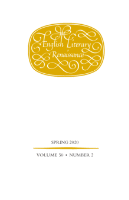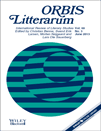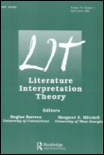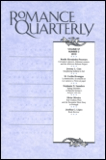
Revista de Letras Norte@mentos
Scope & Guideline
Advancing Knowledge in Linguistics and Literature
Introduction
Aims and Scopes
- Exploration of Identity and Subjectivity:
The journal frequently publishes papers that delve into the complexities of identity, particularly focusing on race, gender, and cultural narratives. This includes the study of black female narratives and the intersectionality of various social categories. - Decolonial Perspectives:
A significant aim of the journal is to contribute to decolonial discourse, analyzing literary works through the lens of colonial history and its impacts on contemporary society. This includes examining the works of authors like Conceição Evaristo and their representations of marginalized voices. - Cultural and Historical Contexts in Literature:
The journal emphasizes the importance of cultural and historical contexts in understanding literature, often publishing comparative analyses that highlight the socio-political dimensions of literary texts. - Psychological and Emotional Dimensions in Literature:
Research focusing on psychological themes, such as trauma, suffering, and resilience, particularly in the context of female experiences, is a core area of interest. This includes the investigation of literary representations of emotional states and their implications. - Multilingual and Multicultural Literature:
The journal explores the dynamics of multilingualism and multiculturalism within literary texts, reflecting on how diverse linguistic backgrounds influence narrative forms and reader interpretations.
Trending and Emerging
- Intersectionality in Literary Studies:
The journal showcases a growing interest in intersectionality, particularly how various forms of oppression (race, gender, class) intersect in literary narratives. This theme is increasingly relevant in discussions surrounding identity politics. - Mental Health and Literature:
There is an emerging focus on the representation of mental health issues in literature, particularly how narratives address psychological suffering, resilience, and healing, especially among marginalized groups. - Afro-Brazilian Literature and Cultural Representation:
Papers exploring Afro-Brazilian literature and cultural representation are trending, highlighting the contributions of black authors like Conceição Evaristo. This reflects a broader movement towards recognizing diverse voices in Brazilian literature. - Digital Culture and Literature:
With the rise of technology and digital communication, the journal is increasingly publishing works that examine the intersection of literature with digital culture, including the impact of social media on literary production and reception. - Environmental Literature and Ecocriticism:
Emerging themes in environmental literature and ecocriticism are gaining traction, reflecting a growing awareness of ecological issues and their representation in contemporary narratives.
Declining or Waning
- Traditional Literary Analysis:
While the journal has historically included traditional literary critiques, there seems to be a waning interest in purely formalist approaches, with a shift towards more interdisciplinary and socially engaged analyses. - Focus on Canonical Literature:
There is a noticeable decline in the publication of analyses centered solely on canonical texts. Instead, there is a growing preference for contemporary works and those from marginalized voices, suggesting a move away from established literary canons. - Historical Literary Criticism Without Social Context:
Papers that engage in historical literary criticism without connecting to current social issues or contexts are becoming less frequent. The journal increasingly prioritizes research that ties literary analysis to contemporary societal challenges.
Similar Journals

Trans-Revue de Litterature Generale et Comparee
Exploring Literary Boundaries, Bridging CulturesTrans-Revue de Litterature Generale et Comparee, published by PRESSES SORBONNE NOUVELLE, is a prestigious journal dedicated to the field of comparative literature. With an ISSN of 1778-3887, this journal serves as a vital platform for scholars and researchers in literature to explore cross-cultural narratives and textual analyses that transcend linguistic boundaries. Although it operates under a traditional access model, the journal's commitment to fostering academic dialogue ensures a rich repository of contemporary literary scholarship. Located in the heart of Paris at 8 RUE SORBONNE, PARIS 75005, FRANCE, it reflects the city’s intellectual heritage, promoting rigorous exploration of global literary trends through its varied scope. Trans-Revue not only enhances the understanding of literature across cultures but also inspires future research, making it an essential resource for students, professionals, and academicians alike.

ENGLISH LITERARY RENAISSANCE
Advancing Scholarship in English LiteratureENGLISH LITERARY RENAISSANCE, published by University of Chicago Press, stands as a pivotal academic journal in the realm of Literature and Literary Theory. With a historical pedigree dating back to 1971, this esteemed journal has made significant contributions to the study of English literature, exploring a wide array of themes, methodologies, and critical interpretations that underscore the richness of literary discourse. The journal is ranked in the Q2 category for literature and literary theory and is positioned in the 89th percentile in the Scopus rankings, affirming its impact within the field. Although it does not operate under an open access model, ENGLISH LITERARY RENAISSANCE continues to attract a vibrant community of scholars and educators eager to engage with its rigorous scholarship and innovative approaches. This journal not only serves as a platform for groundbreaking research but also fosters critical dialogue that shapes the future of literary studies.

PORTUGUESE STUDIES
Advancing Knowledge in Portuguese StudiesPORTUGUESE STUDIES is a prominent academic journal published by the Modern Humanities Research Association, dedicated to exploring the rich tapestry of Portuguese culture, history, and literature. With its ISSN 0267-5315 and E-ISSN 2222-4270, the journal has been a vital resource for scholars since its inception in 2002 and continues to contribute valuable insights into the study of Portuguese heritage. Operating from its base in the United Kingdom, the journal encompasses a diverse range of topics that reflect its dynamic scope within Cultural Studies, History, and Literature and Literary Theory. Although currently not categorized as Open Access, the journal's scholarly contributions have attained respectable Scopus rankings, with Q4 and Q3 placements illustrating its growing influence within the academic community. Researchers, professionals, and students alike will find PORTUGUESE STUDIES an indispensable platform for enriching their understanding and discourse on Portuguese affairs, ensuring its crucial role in fostering intellectual engagement and discovery in the humanities.

MESTER
Fostering Critical Thought in Literature and LanguageMESTER is a distinguished academic journal published by the UCLA College of Humanities, known for its commitment to advancing research in the fields of Cultural Studies, Linguistics and Language, and Literature and Literary Theory. With an ISSN of 0160-2764, this journal serves as a vital platform for scholars and professionals to disseminate innovative research and critical perspectives from diverse theoretical frameworks and cultural contexts. Although currently operating without an Open Access model, MESTER continues to uphold a rigorous peer-review process, ensuring that published articles maintain high academic standards. Recognized for its selective focus, MESTER holds a Q4 categorization in Cultural Studies and Linguistics, and Q3 in Literature and Literary Theory, situating it as a relevant, if emerging, voice within these disciplines. Housed within the significant repository of knowledge at UCLA, the journal beckons researchers, students, and practitioners to engage with its contributions to the humanities and build upon its foundations in cultural discourse.

ORBIS LITTERARUM
Championing Innovative Perspectives in Literary StudiesORBIS LITTERARUM, published by Wiley, is a prestigious journal in the field of Literature and Literary Theory, aiming to foster in-depth scholarly discussions and critical analyses of literary works and their theoretical underpinnings. With its ISSN 0105-7510 and E-ISSN 1600-0730, the journal presents a rich legacy that spans several decades, having converged its publishing efforts from 1943 to 1950 and from 1954 to the present day, thus ensuring a continuity of discourse in the literary field. Recognized for its high quality, ORBIS LITTERARUM is ranked in the Q2 quartile of literature disciplines as per the 2023 metrics, placing it within the top 26% of its category and earning a favorable position in the Scopus Rankings with a percentile of 74 in the arts and humanities. Researchers, professionals, and students alike are encouraged to contribute to this esteemed journal to engage with contemporary literary debates and to influence future scholarship in literature, enhancing understanding of texts across cultures and epochs.

LIT-Literature Interpretation Theory
Transforming Literary Discourse Through Innovative Analysis.LIT-Literature Interpretation Theory is a premier academic journal that delves into the intricate relationships between literature and various interpretative theories, published by Routledge Journals, Taylor & Francis Ltd. With an ISSN of 1043-6928 and E-ISSN 1545-5866, this journal has established a notable reputation within the field, evidenced by its ranking in the 71st percentile among peers, and its placement in Q3 of the Literature and Literary Theory category for 2023. Since its inception in 1989 and continuing through 2024, LIT has aimed to provide a platform for the examination of literary texts through diverse theoretical lenses, catering not only to scholars and researchers but also to students and practitioners interested in literary discourse. Although it does not offer open access, the journal continues to be a vital resource for those seeking to enhance their understanding of literary theory within the arts and humanities. With robust insights and critical analyses, LIT contributes significantly to ongoing conversations in literature and promotes innovative interpretations that challenge conventional perspectives.

World Literature Studies
Advancing Interdisciplinary Perspectives in LiteratureWorld Literature Studies is a leading academic journal published by the Institute of World Literature at the Slovak Academy of Sciences, dedicated to advancing the field of literary studies. With an ISSN of 1337-9275 and an E-ISSN of 1337-9690, this journal has established itself as a prominent platform for scholarly research and discourse, earning a prestigious Q1 ranking in the Literature and Literary Theory category as of 2023, placing it in the top 25% of journals in its field according to Scopus metrics. Operating from Slovakia, the journal caters to a global audience, highlighting diverse perspectives in world literature and fostering interdisciplinary collaboration. Though it currently offers no Open Access option, it maintains a rigorous peer-review process that ensures the quality and integrity of published works. Researchers, students, and literary professionals alike will find the journal's comprehensive articles and critical analyses essential for staying informed about the latest developments and trends in literature and literary theory.

Eixo e a Roda-Revista de Literatura Brasileira
Exploring the Depths of Brazilian Literary HeritageEixo e a Roda-Revista de Literatura Brasileira is a pioneering academic journal dedicated to the exploration and dissemination of Brazilian literature, published by the Federal University of Minas Gerais, Faculty of Letters. Since its inception in 1982, this Open Access journal has provided a vital platform for researchers, educators, and enthusiasts to share innovative ideas and critical analyses related to Brazilian literary studies. With its ISSN 0102-4809 and E-ISSN 2358-9787, the journal attracts a diverse readership and invites submissions that contribute to the richness of Brazilian cultural discourse. Located in Belo Horizonte, Brazil, the journal plays a critical role in advancing scholarly dialogue and promoting accessibility in literature research, fostering an inclusive environment for academic exchange.

ROMANCE QUARTERLY
Unveiling the Rich Tapestry of Romance ScholarshipROMANCE QUARTERLY is an esteemed journal published by Routledge Journals, Taylor & Francis Ltd, focusing on critical discussions and innovative research in the fields of Cultural Studies and Literature and Literary Theory. With its inception in 1986, this journal has diligently documented the evolving landscape of romance literature, making significant contributions through interdisciplinary approaches that resonate across literature and cultural scholarship. Holding a commendable position in academic rankings, it is classified in the second quartile for Literature and Literary Theory, and in the third quartile for Cultural Studies as of 2023, highlighting its relevance and impact within these domains. While it operates under a traditional access model, the required scholarly discourse and access to contemporary studies make it a crucial resource for researchers, educators, and students alike. ROMANCE QUARTERLY serves not merely as a platform for publishing but as a vibrant hub for the exploration and analysis of romance narratives, offering invaluable insights into their impact on cultural and societal constructs, surely a must-read for anyone passionate about these subjects.

Ermeneutica Letteraria-Rivista Internazionale
Exploring Innovative Paradigms in HumanitiesErmeneutica Letteraria-Rivista Internazionale, published by FABRIZIO SERRA EDITORE, serves as a notable platform for the ongoing discourse in the fields of Arts and Humanities, Linguistics, Literature, and Literary Theory. Since its inception in 2019, this scholarly journal has become a significant reference point for innovative research while critically engaging with various literary paradigms and linguistic phenomena. Although currently classified in the Q4 quartile across its respective categories by Scopus, its commitment to open discourse invites submissions that challenge existing norms and broaden the horizons of contemporary literary critique. The journal's holistic approach not only supports the scholarly community in Italy but also aims to foster international dialogue among researchers, professionals, and students in the humanities. The journal is located in Pisa, Italy, and due to its open access policy, it seeks to ensure that knowledge is accessible to a wider audience while contributing to the collective understanding of literary interpretations and linguistic developments.